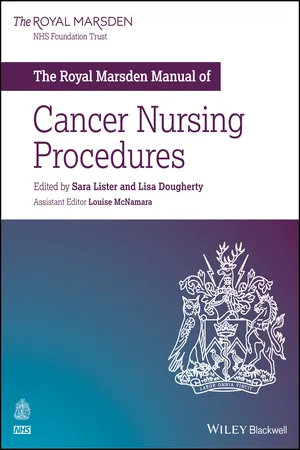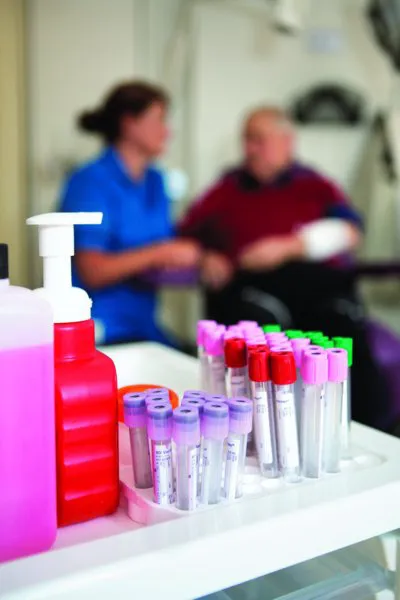
The Royal Marsden Manual of Cancer Nursing Procedures
- English
- ePUB (mobile friendly)
- Available on iOS & Android
The Royal Marsden Manual of Cancer Nursing Procedures
About This Book
The Royal Marsden is the world's first hospital dedicated to cancer diagnosis, treatment, research and education – a centre of excellence with an international reputation for ground-breaking research and pioneering the very latest in cancer treatments and technologies, as well as specialising in cancer diagnosis and education.
This companion volume to the internationally successful The Royal Marsden Manual of Clinical Nursing Procedures is designed to support practitioners who work specifically with oncology patients by providing detailed evidence-based procedures and rationale, and problem-solving guidance on all aspects of oncology nursing.
The Royal Marsden Manual of Cancer Nursing Procedures:
- Is organized and structured to represent the needs of the patient along their care pathway
- Provides the latest evidence underpinning all procedures
- Includes information on haematological procedures; pain assessment and management; wound care; oncological emergencies; and end-of-life care
- Gives detailed guidelines on supporting patients living with cancer with practical information on such things as benefits, exercise and nutrition.
The Royal Marsden Manual of Cancer Nursing Procedures is an invaluable, definitive resource for all those involved in the provision of cancer care and support to patients and their families.
Frequently asked questions
Information
CHAPTER 1
Diagnostic investigations
Procedure guidelines

Overview
- tumour markers
- cervical smears
- diagnostic radioisotope procedures (nuclear medicine)
- transrectal prostate biopsy
- flexible cystoscopy
- breast diagnostics
- genetic testing.
Diagnostic tests and investigations
Definition
Related theory
Evidence-based approaches
Rationale
Indications
Box 1.1 Good practice in specimen collection
- Appropriate to the patient's clinical presentation.
- Collected at the right time.
- Collected in a way that minimizes the risk of contamination.
- Collected in a manner that minimizes the health and safety risk to all staff handling the sample.
- Collected using the correct technique, with the correct equipment and in the correct container.
- Documented clearly, informatively and accurately on the request forms.
- Stored/transported appropriately.
Principles of care
Table of contents
- Cover
- Title Page
- Copyright
- Foreword
- Acknowledgements
- List of contributors
- List of abbreviations
- Quick reference to the procedure guidelines
- How to use your manual
- Introduction
- CHAPTER 1 Diagnostic investigations
- CHAPTER 2 Haematological procedures
- CHAPTER 3 Cancer pain assessment and management
- CHAPTER 4 Administration of systemic anticancer therapies
- CHAPTER 5 Radionuclide therapy
- CHAPTER 6 Wound management
- CHAPTER 7 Acute oncology
- CHAPTER 8 Living with and beyond cancer
- CHAPTER 9 End of life care
- Index
- EULA